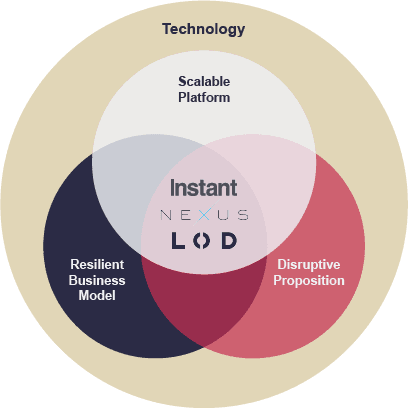The meaning of technology-enablement has evolved. It is no longer simply about achieving operational efficiencies. Today, a provider of business services can use technology to enhance its value proposition, improve its quality of service, and strengthen its client relationships – thereby enabling it to create a scalable platform for growth, develop a disruptive proposition and increase the resilience of its business model.
Bowmark has significant experience of investing in B2B services and outsourcing businesses, which deliver best-in-class solutions through the use of, and investment in, technology. We have also supported a number of these companies in developing and implementing strategies that disrupt traditional value chains. These include Nexus, the UK’s leading corporate rental vehicle provider, Lawyers on Demand (“LOD”), the fast-growing provider of alternative legal services, and The Instant Group, a global leader in flexible workspace solutions.

Creating a scalable platform
At its simplest, technology facilitates data capture and a deeper understanding of customer behaviour and purchasing patterns, which can then be used to develop better client solutions and to make more informed strategic decisions. In addition, technology can help service providers to build a scalable platform for growth, by automating workflows, delivering efficiency gains and improving the quality of service.
Take Nexus, the leading B2B broker of rental vehicles. Nexus connects corporate clients with more than 130 vehicle rental providers and 550,000 vehicles using a proprietary end-to-end system, which combines front-end, client-facing technology with back-office systems. This technology-enabled platform allows Nexus’s clients to rent vehicles from 2,000 locations in seconds at the click of a mouse or via a smartphone, whilst also providing them with significant savings in their rental costs.
Corporate customers and rental companies interact regularly with Nexus’s technology platform, which has become embedded within procurement processes and workflow, thereby facilitating access to rental vehicles on demand. It delivers a better quality service than traditional broker models, while also permitting fleet capacity to be increased or reduced in a fast and flexible way.
Developing a disruptive proposition
Business services companies are increasingly employing technology to extend the scope of their service propositions and to move up the value chain to disrupt incumbent providers and traditional service models. Outsourcing has historically been dominated by global companies differentiated by their scale, method of delivery (including onshore and offshore provision) and price. Today, the business services landscape is more fragmented, with niche providers disrupting the value chain through deep expertise, sector knowledge and flexibility. In short, competitive advantage in outsourcing is increasingly being driven by service quality and outcomes, rather than simply by cost.
Technology enables business services companies to institutionalise their intellectual property, reducing the reliance on key individuals and creating better consistency and quality of service. It also helps them to be nimble and to operate leanly, allowing them to pass on more value to their customers.
As an example, the legal services sector is currently undergoing disruption following a period of de-regulation. The in-house legal departments of large corporates are under pressure to deliver more work at lower cost, and are increasingly outsourcing legal activities – at the expense of traditional law firms – to a growing pool of experienced, independent lawyers seeking flexibility and more varied careers. On the one hand, technology is helping general counsel to optimise outcomes and better manage their costs. On the other, it is allowing lawyers to work remotely and on-demand.
At LOD, changing attitudes within corporate legal departments have been a key driver of growth. The company supplies flexible legal solutions to more than 500 corporate and law firm clients, allowing them to increase the capacity, flexibility and expertise of their teams, without adding to their fixed cost base.
LOD offers a range of different customer solutions. Its “On Site” offering supplies lawyers who work as part of in-house teams, while its “Managed Solutions” provide teams of lawyers, supported by technology, that take responsibility for project management and delivery of specific legal activities on a long-term basis. More than 600 lawyers and consultants choose to work with LOD because it enables them to work with a variety of blue-chip clients, whilst providing their services on a flexible basis that suits their needs better than permanent roles in large organisations.
Improving resilience
Business customers are sophisticated consumers of technology, and service providers can use technology to drive new business development by introducing superior client-facing platforms, a thoughtfully-designed user experience and advanced data capture.
Client-facing technology can also help embed a service provider in a customer’s workflow and operations, driving account growth and creating a loyal installed client base with high levels of repeat revenue. Good platforms drive customer engagement and provide an essential tool to develop usage and data, support service extension, improve quality and deliver long-term client retention.
The Instant Group, another Bowmark portfolio company, started life as a broker of office space and has become a disruptive provider of flexible managed offices, evolving from a mainly transactional business to a leading provider of workspace solutions.
Through its worldwide proprietary data and online procurement platform (www.instantoffices.com), Instant finds flexible workspaces across 150 countries for more than 7,000 businesses each year, including large, multinational organisations. In addition to serving clients seeking one-off broking services, Instant uses its data and market insight to support clients looking to fully outsource their commercial property needs, by providing an end-to-end service with portfolio reporting and insight, fixed payment terms and cost certainty for the duration of contracts.
In conclusion, technology is transforming the business services sector, creating new opportunities to increase operational efficiency, add value to service propositions and deliver enhanced client interactions. Companies that can exploit these opportunities will gain market share from less nimble competitors and are well-positioned to create scalable platforms for growth, develop disruptive propositions and increase the resilience of their business models.
Associated investment

Nexus
Technology-enabled vehicle rental provider Nexus significantly increased its penetration of the corporate market and launched a new service in the HGV sector
Read more
In the news
19 November 2025
Transparity named Microsoft Nonprofit Partner of the Year
Read more
13 November 2025
Bowmark hosts annual portfolio Carbon Forum
Read more

